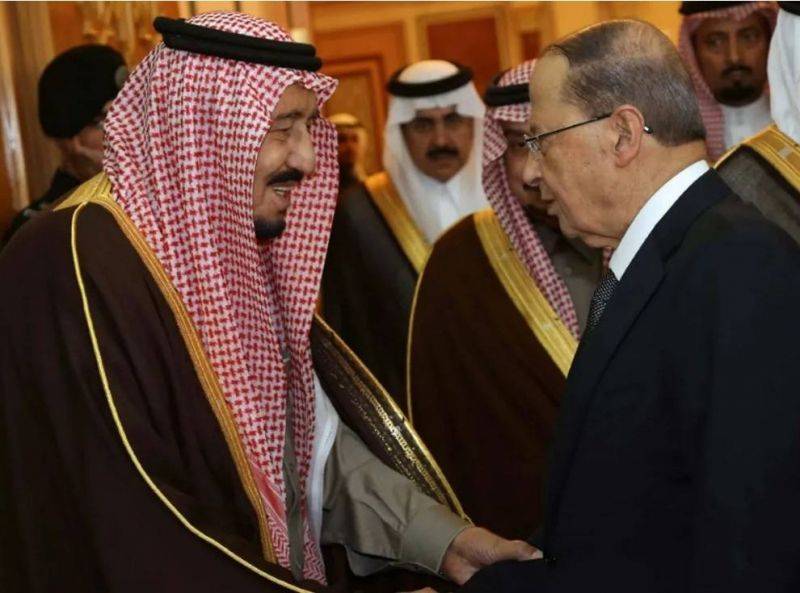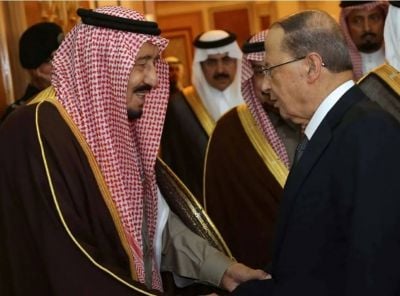
King Salman of Saudi Arabia receives Aoun in Riyadh in January 2017. (Credit: Dalati and Nohra)
Webhi’s comments were just the latest episode of reciprocal enmity between the Aounist camp and the Gulf countries.
First, came the Taif Agreement that ended the 1975-90 Civil War. The deal, sponsored by Saudi Arabia, granted Sunnis some of the pre-eminent prerogatives and powers formerly held by Christians. It was slammed by Michel Aoun.
When he returned to Lebanon from exile in France in 2005, the Christian leader built his political project on his opposition to the Taif Agreement and the policies of late former Prime Minister Rafik Hariri, backed by the Saudis, and later on his alliance with Hezbollah.
The gap between Aoun and the Gulf countries widened further when the Syrian–Saudi agreement, which allowed Saad Hariri to become prime minister, was brushed aside two years after he took office in 2009.
In 2011, 11 ministers, including those of Hezbollah and the Free Patriotic Movement, announced their resignation from Rabieh, Aoun’s stronghold, which brought down the government.
This step prompted Riyadh to believe that the then head of the FPM, Aoun, had aligned himself with Iran, the kingdom’s main rival in the region.
The mistrust of the Gulf countries, with Saudi Arabia in the lead, vis-à-vis Aoun was particularly embodied by one man: Saud al-Faisal.
At the 2008 Doha Summit, the powerful then foreign minister minister vetoed an agreement that would have allowed Aoun, who was seen as hostile to Saudi interests, to ascend to the presidency.
In 2014, as what would become the 2016 presidential compromise was beginning to take shape, Faisal opposed, once more, Aoun’s arrival in Baabda.
After the Saudi minister’s death in 2015, Aoun told his close associates, “The one who prevented me from taking the presidency is now dead.”
However, relations between the two sides did not particularly improve afterwards.
New approach
The kingdom was opposed to the presidential compromise, but was nonetheless ready to give it a chance, as Hariri assured Riyadh he would help drive a wedge between the Christian leader and Hezbollah.
The new Baabda tenant chose Riyadh as the destination for his first diplomatic visit in January 2017.
At the time, the president and his son-in-law Gebran Bassil promised Saudi Arabia that they would place Lebanon back into the bosom of the Arab nation and distance it from Iran. The two men also called for international resolutions to be respected.
These promises were never honored. As foreign minister, Bassil refused to side with Riyadh as it intervened in the war in Yemen against the Iran-backed Houthis. He also failed to condemn missile attacks on the kingdom by Tehran and its proxies.
“Aoun and Bassil are not hostile to Saudi Arabia. But they did not wish to engage Lebanon in conflicts which transcend it,” an FPM member said.
Saudi Arabia also reproaches the president’s son-in-law for fueling criticism of Crown Prince Mohammed bin Salman after Hariri, under duress, announced his resignation as prime minister while in Riyadh back in 2017.
“Saudis are angry with Bassil in person,” an Arab diplomat well-established in the Gulf said. “This is why he was never able to get a meeting with [Saudi Ambassador to Lebanon] Waleed Bukhari, while the latter agreed to receive Salim Jreissati, the president’s adviser,” the source added.
The scale of the Lebanese crisis and the tensions between the president and the prime minister-designate, who no longer enjoys Riyadh’s support, have prompted the Aounist camp to attempt a new approach vis-à-vis the kingdom.
Based on the common antagonism toward the Future Movement leader, the president’s camp had been trying to patch things up with Riyadh. Notably, Jreissati visited Bukhari in March. Then, after several invitations, the Saudi diplomat finally visited the presidential palace.
But because Bukhari’s visit came at a time of strong tension between Aoun and Hariri, the Aounist camp interpreted it as official Saudi support of the president over the premier-designate.
This interpretation was widely publicized in the media, which angered Bukhari and prompted him to put an end to a possible rapprochement with Aoun and his son-in-law.
‘We are aware of Aoun’s leanings’
Wehbi’s remarks then came as the final nail in the coffin of any chance of reconciliation between the two sides. The president has tried to limit the damage but to no avail.
During a televised debate on Alhurra TV on Monday, Wehbi had an altercation with a Saudi co-guest, and stormed off set, saying that he would not be “insulted by a Bedouin.”
Since he was speaking in his capacity as foreign minister, the kingdom considered his remarks as Lebanon’s official position.
“We are aware of Aoun’s leanings and that he has built his entire political project on hostility toward the Gulf states,” a Saudi diplomat said on condition of anonymity.
He added that “Saudi Arabia has decided not to take any punitive measures against Lebanon because it does not wish to further complicate the situation and empty the arena, which is what Iran and Hezbollah want.”
Wehbi’s remarks have raised fears that Saudi Arabia might take measures against thousands of Lebanese based and working in the Gulf.
However, the minister’s mea culpa and the fact that he asked to be relieved of his duties somehow eased tensions.
“Bedouins have at least one quality, they keep their word,” the Saudi diplomat said, a jab at Bassil, whom the kingdom considers an untrustworthy political figure.
The FPM, on the other hand, is trying to limit the damage. “Michel Aoun was extremely angry at Wehbi’s comments. He immediately contacted the Saudi ambassador to assure him that the remarks did not reflect the country’s official position,” a source close to the president said on condition of anonymity.
Several representatives of the Aounist parliamentary bloc have contacted the Saudi ambassador to renounce Wehbi’s remarks.
“There were debates within the bloc between those who immediately wanted Wehbi out and those who felt that it was possible to solve the problem in another way,” the aforementioned FPM member said.
While the kingdom might still want Hariri to step down, it does not wish to be politically responsible for this development. In other words, Riyadh is not going to push the Sunni leader to give up his post, as the Aounist camp hopes.
“They don’t know us and we will not harm Hariri to serve their interests. No one can come between Hariri and Saudi Arabia, no matter the differences we might have with him,” the Saudi diplomat said.
This article was originally published in French in L'Orient-Le Jour. Translation by Sahar Ghoussoub.
